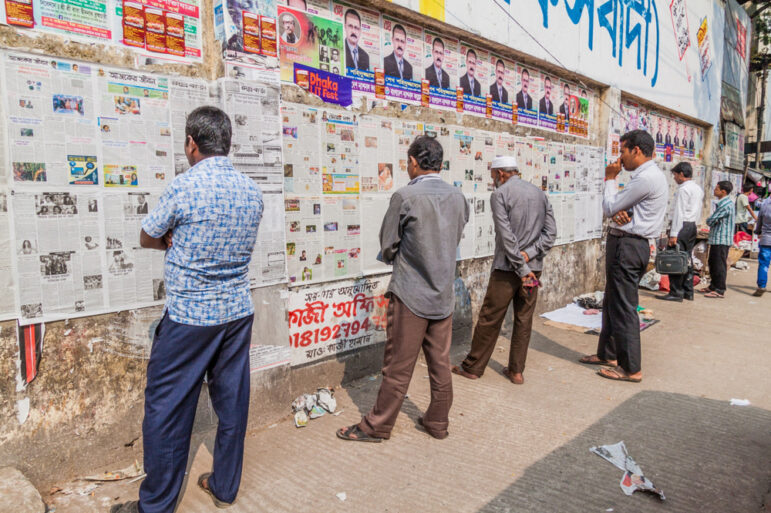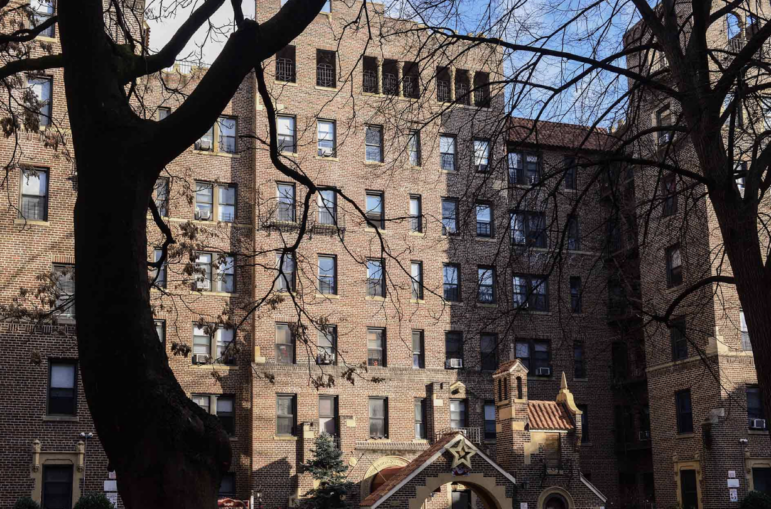Selecting the best investigative reports of the year is an extremely daunting, yet rewarding task. Keeping tabs on Bangladesh’s more than 45 private TV channels, 1200 daily newspapers, and hundreds of online news portals — not to mention social media and editors’ recommendations — is practically impossible for just one individual.
So why is it rewarding? Because, while sorting and searching for 2023’s top investigations, we realize how newsrooms and reporters continue to produce outstanding investigations in an increasingly challenging media environment, which is reflected by the continuous fall in Reporters Without Borders’ World Press Freedom Index.
This year’s selections are even more significant, with the national elections on the doorstep, the rise of disinformation and digital threats, deepening economic uncertainties, and a shrinking civic space. Our top picks reflect these broader trends, with stories exposing disinformation operations in the run-up to elections, human rights violations by law enforcement agencies, corruption involving politically important individuals, online abuse of women, systemic irregularities in the health sector, and exploitation of agriculture workers.
These stories come from diverse media sources, including newspapers, TV networks, online portals, global news agencies, regional nonprofits, exiled newsrooms, and, more significantly, local news websites and reporters competing with more resourceful national and international media publishers. Here is our best of 2023.
Fake Experts Push Political Disinformation in Lead Up to Bangladesh Elections
As Bangladesh gears up for parliamentary elections in January 2024, the country faces escalating tensions as the main political opposition boycotts the process, demanding oversight from a neutral caretaker government. With the vote approaching, an AFP investigation found more than 700 pro-government articles written by nearly three-dozen fake or unknown authors have been published on mainstream news websites. Through social media searches and interviews with organizations cited in their credentials, the reporters found no online presence or verifiable records for the authors.
For example, one writer with a social media profile photo identifying an Indian actress and phony credentials, had written at least 60 articles praising the current government. The AFP traced the rise of these dubious articles as far back as September 2022, not long after the Foreign Ministry called for news submissions to counter “propaganda” critical of the government.
Expensive Gifts to Doctors Inflate Treatment Cost
Doctors accepting gifts from pharmaceutical companies and commissions from diagnostic centers is a widespread and well-known practice in Bangladesh, but it has seldom been investigated on the scale undertaken by Ekushey Patrika, a media outlet based in the southern city of Chattagram. This is due, in part, to the industry’s influence on Bangladeshi media, as many large news outlets are owned by the same business groups that own pharmaceutical companies, which often leads to the censorship of stories related to this sector.
This series broke from that pattern to shed light on the systemic kickbacks from these companies and their significant impact on the healthcare system. It revealed how pharmaceutical companies provided incentives — including money, cars, and even houses — to doctors for promoting their medicines, a practice in violation of the Code of Pharmaceuticals Marketing Practices, that ultimately raises drug costs for patients.
A companion project found that doctors were also receiving substantial commissions from diagnostic centers for prescribing tests. According to the report, the rate of commission, often innocently called a “referral fee,” ranges from 20 to 40%, depending on the type of test and the reputation of the doctors. This, too, ultimately inflates healthcare costs. Throughout the months-long investigation, the reporter gathered a variety of evidence, including copies of 65 bank checks to the doctors, dozens of prescriptions, and interviews with whistleblowers within the pharmaceutical companies.
Adolescents Facing Trauma in Detention
This investigation by the Chattagram-based online news portal cvoice24.com revealed that Chattagram Central Jail housed 220 inmates under 18 who had been incorrectly categorized as “adult criminals,” often due to arbitrary age determinations by the police. These failures directly contradict a 10-year-old law that requires police to make every effort to document a potential minor detainee’s correct age and, if they cannot, the individual is to be treated as a child.
The reporter investigated 10 such cases, analyzing case records, and conducting interviews with victims, their family members, lawyers, and concerned police officials. The story pointed out that, despite their adolescence, the accused youth were routinely incarcerated alongside adult inmates, and even after being granted bail, these minors continued to grapple with trauma and social stigma.
The Telegram Blackmailers
This investigation by Searchlight, an investigative television program of Channel 24, uncovered a disturbing operation where a group of perpetrators sells intimate, non-consensual videos of young girls through Telegram groups, exploiting victims through blackmail. According to the report, the perpetrators threaten victims with the sharing of personal videos online unless their demands are met. To amplify their threats, they advertise on Facebook, YouTube, and Instagram with promotional videos containing snippets of the explicit content, along with the social media details of the victims.
Prompted by a victim’s complaint, a reporter infiltrated the Telegram group, documenting numerous videos of young women being sold as premium content to more than 200 customers. The report featured interviews with traumatized victims, one of whom contemplated suicide, highlighting the profound impact on victims, their families, and social lives.
The investigative team on this project chose to collaborate with law enforcement, sharing their findings and aiding in the identification of several of the blackmail group’s members, including the leader, through traced phone numbers used for collecting payments. The police ultimately made multiple arrests related to the cybercrime. This episode of Searchlight has been viewed 1.3 million times on YouTube alone since it was published.
Inside a Police ‘Death Squad’
This joint investigation by Deutsche Welle and Netra News uncovered alleged human rights violations by the Rapid Action Battalion (RAB), a specialized force within the Bangladesh Police. The report built on whistleblower accounts, detailing the inner workings of the RAB, describing carefully planned operations that included abductions, torture, and extrajudicial killings, often followed by the planting of evidence to justify their actions. The investigation cross-checked and corroborated the whistleblowers’ accounts with experts, human rights activists, and various sources.
However, the Ministry of Home Affairs denied the allegations, terming them “fictitious, fabricated, and politically motivated.” The US embassy has acknowledged its past role in training and supporting the RAB, but said it terminated its funding in 2018. In 2021, the US subsequently imposed sanctions on the RAB and officials in response to ongoing human rights concerns.
According to the investigation, human rights activists claim the RAB perpetrated more than 700 killings between 2009 and 2021, with political targets increasingly among its victims. The investigation shed light on the rampant impunity surrounding the police unit’s actions, challenging the government’s denial of past human rights violations.
Sport Star’s Dubai Trip Linked to Murder Suspect
In one of the most talked-about stories of the year, Daily Pratidiner Bangladesh revealed that Bangladesh’s foremost sports star, Shakib Al Hasan, traveled to Dubai for the grand opening of a jewelry shop at the invitation of a man who is accused of murdering a police officer in Bangladesh and currently evading the law.
The report detailed this journey from criminal fugitive to a jewelry business owner, unveiling a complex web of false identities. After allegedly committing the crime, the suspect managed to evade authorities, flee to India where he assumed a false identity, got married, and later settled in Dubai. The investigation raised questions about the legitimacy of his business, the source of his wealth, and the involvement of several celebrities such as Al Hasan in the grand opening event.
Starting from a social media post, the reporter systematically uncovered the man’s checkered past by scrutinizing case documents, passport details, and company records and interviewing witnesses both in Bangladesh and India to establish connections among different parts of his transformation from fugitive to jewelry shop owner.
A Politician’s Suspicious Property Buying Spree in New York City
This OCCRP investigation revealed how a member of parliament in Bangladesh acquired nine properties in New York City, purchases that totaled more than $4 million between 2014 and 2019. According to the report, the politician had previously worked low-paying jobs in the US, including as a cab driver and a pizza cook, before returning to Bangladesh in 2009 to work as the Special Assistant to the Bangladesh Prime Minister. His unexpected property purchases started in 2014, five years after he was appointed to that position and continued until one year after being elected to parliament in 2018.
OCCRP raised questions about how the MP paid for his real estate deals, since his official salary during the time period in question was only equivalent to US$1,000 a month. The report examined property records, financial disclosures, and regulatory guidelines to highlight potential legal and financial irregularities, including the MP’s failure to disclose these New York properties in official declarations, the absence of approval for fund transfers from Bangladesh, and the accumulation of assets while still holding US citizenship.
‘Water Lords’ Extort Drought-Stricken Farmers

A tube well irrigates rice seedlings in Jamalpur, northern Bangladesh. Image: Screenshot, Mamunur Rashid, Alamy
Third Pole, a nonprofit newsroom that covers the Himalayan watershed, shed light on the irrigation crisis faced by millions of farmers in Bangladesh’s drought-prone northwestern districts, specifically within the Barind Tract, an area that produces nearly 40% of Bangladesh’s rice. It revealed the exploitation of marginalized farmers by politically influential “water lords” or “motorwalas” amid diversions of rivers and reduced surface water due to drought.
According to the report, the water lords who control shallow tube wells exploit farmers by charging high prices, increasing rates during heat waves, and demanding advance payments —leading to financial struggles for agricultural communities. The report showed the devastating impact of these predatory practices on crop yields and farmers’ livelihoods and how it even contributed to two Indigenous farmers committing suicide. A lack of official oversight also facilitated violations, Third Pole found, as government-appointed motor operators set prices in collusion with the private pump owners.
In a classic example of shoe leather reporting, the reporter spent months visiting different corners of the region, tracing the lives of the farmers in different seasons from the cultivation of crops to harvesting, talking to dozens in the marginalized communities to bring out the impact of high water prices. The reporter also interviewed the tube well owners, officials, and local lawmakers to reveal the regulatory flaws and political influence over the system.
 Miraj Chowdhury is the editor of the GIJN Bangla initiative, and until 2021, was the head of program and communications at MRDI. He has more than a decade of experience in journalism, mainly in broadcast. As a reporter, he specialized in business and economics, with notable investigations that revealed Bangladeshi political leaders lobbying in the US and the Bangladesh Bank cyber heist. He holds a Masters in International Relations.
Miraj Chowdhury is the editor of the GIJN Bangla initiative, and until 2021, was the head of program and communications at MRDI. He has more than a decade of experience in journalism, mainly in broadcast. As a reporter, he specialized in business and economics, with notable investigations that revealed Bangladeshi political leaders lobbying in the US and the Bangladesh Bank cyber heist. He holds a Masters in International Relations.

 4 months ago
31
4 months ago
31









